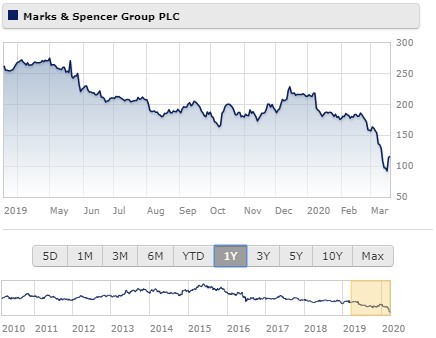Shares in high-street retailer Marks & Spencer (MKS) fell 4.4% to 111p after the firm passed on its final dividend for the year ending 31 March and withdrew its financial guidance for the coming financial year.
In an unscheduled trading update, M&S said that while it was ‘confident that the post crisis future of the business and our transformation programme remains as strong as ever, trading over the next 9-12 months in our Clothing and Home and International businesses is likely to be severely impacted.’
As a result, ‘it is not possible to provide meaningful guidance on future earnings, although we are taking every step to secure future value for shareholders, colleagues, and suppliers.’
CLOTHING & HOME WOES
Pre-tax profit for the year ending 31 March was on track to meet the company’s January guidance up until this week, but are now expected to be ‘at or below the bottom end of the range of £440-460m given probable very depressed trading in Clothing and Home.’
Moreover, it expects a prolonged downturn in Clothing & Home sales ‘at the very least in the first 3-4 months of the next financial year.’ It also expects margins to be ‘severely impacted’ by big markdowns to clear its surplus of unsold seasonal stock, and is trying to defer supply of new lines.
While it says a large part of its core business is non-seasonal ‘essential’ products, ‘at this stage we are not assuming a return to normal trading in the autumn’ in Clothing & Home.
The Food business has so far remained ‘strong’, and M&S expects it ‘to trade profitably throughout’ the downturn in Clothing & Home. It has seen an uplift in recent days as shoppers stock up but its bias towards fresh and chilled food means it hasn’t seen the same level of forward buying of household goods which other retailers have seen.
CUTTING SPENDING
In order to get through the crisis M&S is taking what it calls ‘substantial precautionary action on the cost base, capital expenditures and cash commitments.’
It plans to drastically reduce its capital spending, deferring or cancelling any non-essential spending including marketing, and chopping the supply pipeline by over £100m.
By cutting the final dividend for the current financial year, it should save £130m of cash which it can add to its reserves. It also has a £1.1bn revolving credit facility, which is undrawn and which has a fairly loose covenant based on the ratio of earnings before interest, taxes, depreciation and amortisation (EBITDA) to net interest payments plus IFRS16 depreciation.



